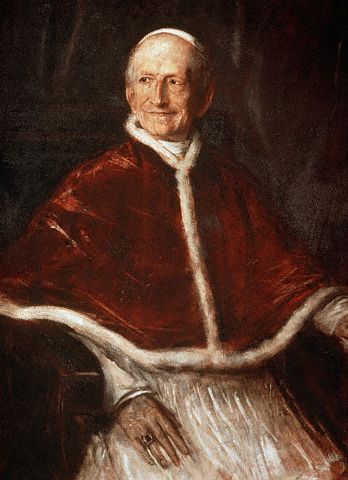三、教宗良十三世《自由》通谕(1888年6月20日)
1、引用通谕第36、37、38款的文献
36、但人们最伟大与最神圣的任务,无疑是热诚与虔敬地顶礼天主。由于吾人永久处于天主权下,并为天主的意志所统治;由于吾人出源于天主,并当回返于天主,故人有义务恭敬天主乃是必然的结论。加以,没有敬德,则不可能有任何美德;因为美德的任务在于引导人们归向天主,他是人们最伟大最崇高的美善。故此敬德是:“实行直接指向光荣天主的事宜的美德。(圣多玛斯)它是诸德之首脑。倘若人问: 有许多不同的宗教,甚至水火不能相容的宗教,究竟该信奉那一门。理智和本性一定回答说,应当信奉天主命人信奉的宗教。同时,这宗教有某些外在的记号可以容易辨认出来。至圣天主曾经立意以这些记号,使真宗教有别于其它宗教。倘若在这关系重大之事上,有所错误,其结果必然造成巨大的丧亡。所以,上述这种信仰自由,不但使人任意违反或放弃履行其至圣任务的权利,又使人可以背弃万善的天主,步向邪恶,则这种自由,如上所提,并非自由,而是自由的堕落,以及使灵魂屈服为罪恶的卑鄙奴役。
37、(有一种错误的行径) 由国家观点来看,“信仰自由”要国家不举行钦崇天主的礼仪,或不准在公共场合举行任何宗教仪式;不准袒护任何宗教,主张同等看待一切宗教,亦不必顾及民众的愿望,即使民众是信仰公教的。想使这种作法正确无误,必须使:“国家没有钦崇天主的义务”或“国家可以任意违反这义务而无罪”的谬论变成真理。但二者显然是虚妄的。社会这个事物,无论由其组成份子及其权力形式(的角度)来研究,还是由其宗旨及其所产生的诸多伟大利益来探讨,绝对无疑,(社会是)由众人结合而组成,乃天主圣意使然。是天主使人(成为)生而为有灵的社会动物:是天主使人生活在社会中,使其通过与他人群居共处,而达至其单独不能获得的一切本性需求。于是,社会亦应当承认天主为其创立者,并尊敬、崇拜天主的统治权。故此,理智及正义皆不许可国家实行同等看待不同的宗教派别,以及将同等权利给与一切宗教的政策;因为这政策与无神论相差无几。
38、既然国家只应信奉一门宗教,则当然必须信奉唯一真宗教。这在公教国家是不难认出的;因为公教显然具有真宗教的一切标记。因此执政者想要善尽他们的职责,明智而有效地顾全国家的利益,必须保障并维护公教。国家权力是为了国民利益而建立的。虽然领导国民达成现世生活的繁荣乃其切身的任务。但不应消减甚至应当提供更多便利,以帮助国民抵达其最高和最终的美善。因为人的永福在于拥有这最高最终的美善;而忽视宗教者,决不可能抵达这宗旨。

2、通谕第36、37、38款文献的英文原文
36.But,assuredly, of all the duties which man has to fulfill,that, without doubt,is the chiefest and holiest which commands him to worship God with devotion and piety.This follows of necessity from the truth that we are ever in the power of God,are ever guided by His will and providence,and, having come forth from Him,must return to Him.Add to which,no true virtue can exist without religion,for moral virtue is concerned with those things which lead to God as man's supreme and ultimate good; and therefore religion, which (as St. Thomas says) "performs those actions which are directly and immediately ordained for the divine honor," rules and tempers all virtues. And if it be asked which of the many conflicting religions it is necessary to adopt,reason and the natural law unhesitatingly tell us to practice that one which God enjoins,and which men can easily recognize by certain exterior notes,whereby Divine Providence has willed that it should be distinguished, because,in a matter of such moment,the most terrible loss would be the consequence of error.Wherefore,when a liberty such as We have described is offered to man,the power is given him to pervert or abandon with impunity the most sacred of duties,and to exchange the unchangeable good for evil; which,as We have said,is no liberty,but its degradation,and the abject submission of the soul to sin.
37、38. This kind of liberty,if considered in relation to the State, clearly implies that there is no reason why the State should offer any homage to God,or should desire any public recognition of Him;that no one form of worship is to be preferred to another,but that all stand on an equal footing, no account being taken of the religion of the people,even if they profess the Catholic faith.But,to justify this,it must needs be taken as true that the State has no duties toward God,or that such duties,if they exist,can be abandoned with impunity,both of which assertions are manifestly false. For it cannot be doubted but that,by the will of God,men are united in civil society;whether its component parts be considered;or its form,which implies authority;or the object of its existence;or the abundance of the vast services which it renders to man.God it is who has made man for society, and has placed him in the company of others like himself,so that what was wanting to his nature, and beyond his attainment if left to his own resources, he might obtain by association with others. Wherefore,civil society must acknowledge God as its Founder and Parent,and must obey and reverence His power and authority.justice therefore forbids,and reason itself forbids, the State to be godless;or to adopt a line of action which would end in godlessness -- namely,to treat the various religions (as they call them) alike,and to bestow upon them promiscuously equal rights and privileges. Since,then,the profession of one religion is necessary in the State,that religion must be professed which alone is true,and which can be recognised without difficulty,especially in Catholic States,because the marks of truth are,as it were,engraven upon it.This religion,therefore,the rulers of the State must preserve and protect,if they would provide -- as they should do -- with prudence and usefulness for the good of the community.For public authority exists for the welfare of those whom it governs;and,although its proximate end is to lead men to the prosperity found in this life,yet,in so doing,it ought not to diminish,but rather to increase, man's capability of attaining to the supreme good in which his everlasting happiness consists: which never can be attained if religion be disregarded.






